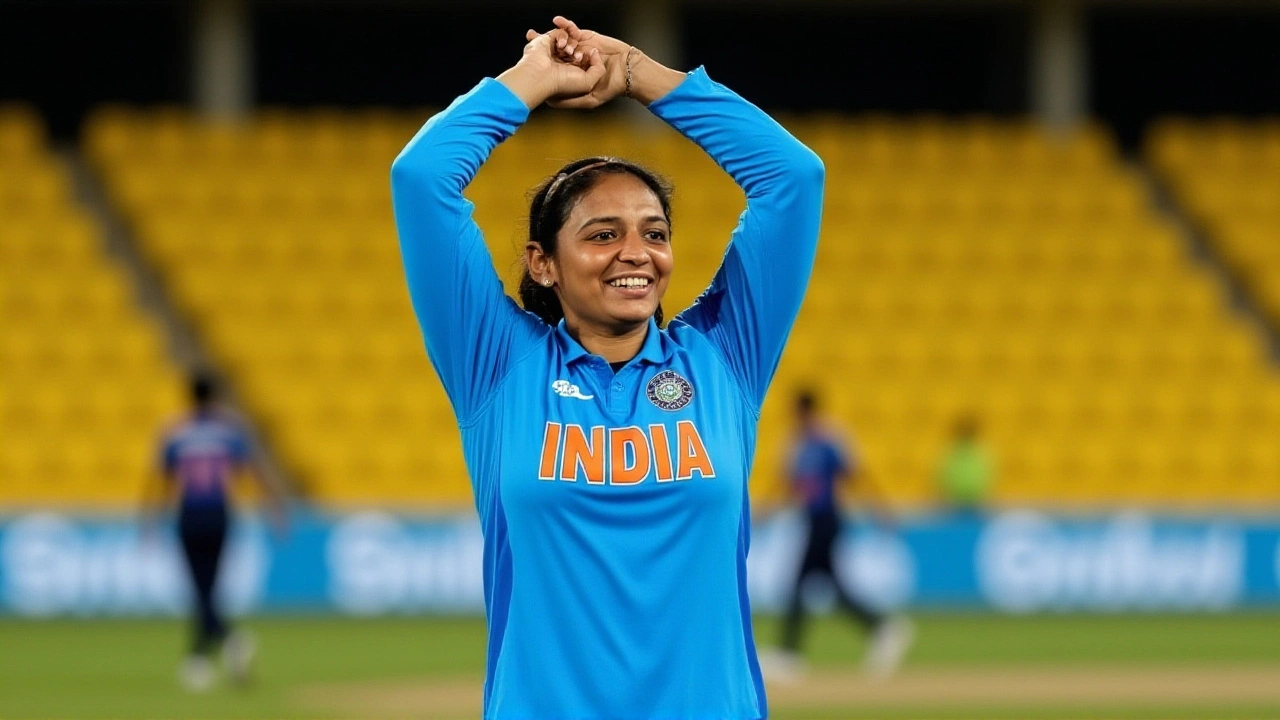
When a simple coin flip goes sideways, the fallout can eclipse even a high‑stakes World Cup clash. That's exactly what happened on October 5, 2025 at the R. Premadasa Stadium in Colombo, Sri Lanka, where a toss blunder turned the India‑Pakistan women's World Cup showdown into a circus of accusations and insect‑induced interruptions.
During the pre‑match ceremony, Fatima Sana, captain of the Pakistan women's cricket team called "tails" as the coin spun. Australian presenter Mel Jones mistakenly announced "heads," but the error slipped past match referee Shandre Fritz, who nevertheless awarded the toss to Pakistan. The decision let them elect to field first, sparking a firestorm on social media that ranged from "toss fixing" claims to criticism of ICC procedural safeguards.
Background: A Rivalry That Goes Beyond the Pitch
The India‑Pakistan cricket rivalry is already one of sport's most intense, fuelled by historical and political undercurrents. Earlier in 2025, the men's teams walked out of handshakes during the Asia Cup after a deadly militant attack on tourists in Indian‑administered Kashmir heightened bilateral tensions. That same no‑handshake stance seeped into the women's game, with captains Harmanpreet Kaur of India and Fatima Sana refusing traditional pre‑match pleasantries at the World Cup. Their separate entrances, lack of eye contact, and solitary conversations with Mel Jones painted a picture of diplomatic strain playing out on a cricket field.
The Toss Mix‑Up and Immediate Reactions
At , the coin was tossed. Fatima's clear call of "tails" should have dictated the outcome, but a slip of the tongue by Jones led the broadcast to display "heads." When the stadium scoreboard mirrored the incorrect result, Shandre Fritz, tasked with overseeing match conduct, failed to intervene. Pakistan, operating under the assumption they won, elected to bowl.
Within minutes, cricket forums lit up. Former ICC official David Richardson tweeted, "A toss is the only part of a game that should be 100% impartial. This error erodes trust." Meanwhile, Indian fans launched #TossGate, demanding a replay. The ICC later released a brief statement saying the incident would be reviewed, but no immediate correction was made.
On‑Field Drama: Insects, Injuries, and a Stalled Over
The match itself offered its own brand of chaos. Around the 34th over of India's innings, a swarm of gnats descended on the outfield, prompting both sides to vacate the pitch for a 15‑minute insect‑repellent spray. Players complained of bites and eye irritation, yet the interruption didn’t eat into the overs count. "We saw more flies than scores on the board," laughed Pakistan bowler Sadia Iqbal in a post‑match interview.
India's opening partnership of Smriti Mandhana and Pratika Rawal eked out a 48‑run stand, but the middle order crumbled after Fatima Sana dismissed Mandhana leg‑before‑wicket for 23 and Iqbal sent Rawal back for 31. Harmanpreet Kaur, already battling a low‑scoring series, added a modest 19 before falling to a well‑timed delivery from Pakistan's lead bowler. At the end of the 24.4‑over mark, India found themselves 106/3, a score that left them trailing the target set by a disciplined Pakistani chase.
Key Figures and Their Statements
- Fatima Sana – "We’re confident with the bowlers; the wicket looks a bit damp, perfect for early swing. Anything under 250 could be a manageable chase."
- Harmanpreet Kaur – "We’re positive despite the illness to Amanjot. Renuka Singh Thakur steps in, and we’ll fight back once we settle in."
- Shandre Fritz – "The toss decision followed the on‑field signal. We’ll assess the protocol after the tournament."
- Mel Jones – "A simple miscommunication. My apologies to both teams; cricket should be about the game, not the coin."
Broader Impact: What This Means for Women's Cricket
Beyond the immediate embarrassment, the incident underscores how fragile the governance of women's cricket can be when under the glare of geopolitics. Sponsors, including a major sportswear brand, have already requested clarification before their ads air during the semifinals. Analysts fear that repeated officiating errors could dampen viewership, especially in markets where women's cricket is still gaining a foothold.
Moreover, the persistent no‑handshake policy signals that cricket diplomacy is unlikely to thaw anytime soon. Dr. Ayesha Khan, a sports sociologist at Lahore University, notes, "The refusal to shake hands is a symbolic protest that reflects deeper national narratives. It also influences young fans, who see sport as an extension of political identity."
What’s Next? Upcoming Matches and Potential Reviews
India’s next game is against England on October 9, while Pakistan faces Australia on October 10. The ICC has promised an internal review of the toss protocol, but no timeline has been set. Fans are hoping for stricter electronic verification—some suggest a digital QR‑code readout in the stadium to eliminate human error.
Meanwhile, both captains have hinted at maintaining the handshake boycott for the remainder of the tournament, citing "team unity" and "security considerations". Whether the toss controversy will fade into the background or become a catalyst for reforms remains to be seen.
Key Facts
- Date: October 5, 2025
- Venue: R. Premadasa Stadium, Colombo, Sri Lanka
- Event: ICC Women's World Cup 2025
- Primary issue: Toss misannouncement leading to contested decision
- Additional disruption: 15‑minute insect‑repellent pause during India’s 34th over
Frequently Asked Questions
How did the toss error happen?
Match referee Shandre Fritz relied on presenter Mel Jones’s live announcement. Jones mistakenly said "heads" after Fatima Sana called "tails," and without an electronic verification system, the error went uncorrected, granting Pakistan the toss.
What impact does the no‑handshake policy have on the tournament?
The policy heightens political tension and drags the sport into diplomatic narratives. It also reduces opportunities for sportsmanship gestures that normally ease high‑pressure moments, potentially affecting player morale and fan perception.
Will the ICC change the toss procedure after this incident?
The ICC has pledged an internal review and hinted at adopting electronic confirmation, such as a QR‑code display, but no official rule change has been announced as of now.
How did the insect swarm affect play?
Both teams left the field for a 15‑minute spray of insect repellent during India’s 34th over. While no overs were lost, players reported bites and visual distraction, which may have contributed to the modest scoring rate.
What are the next matches for India and Pakistan?
India faces England on October 9, 2025, while Pakistan takes on Australia on October 10, both at venues in the West Indies. Both teams will be under scrutiny to see if the controversy influences their performance.
October 8, 2025 AT 09:11
Honestly, the ICC should have automated the coin flip - this fiasco was avoidable 😂.
October 10, 2025 AT 16:49
What a mess but also a chance we all get reminded how tiny details can swing a whole tournament
October 13, 2025 AT 00:27
Coaches must use this as a teach‑in moment, focusing players on adaptable game plans rather than the controversy surrounding the toss.
October 15, 2025 AT 08:06
The incident only amplifies the historic rivalry; any perceived slight, even a coin error, fuels the competitive fire between our nations.
October 17, 2025 AT 15:44
i think adding a simple QR code on the scoreboard could fix this quickly, just makin sure everyone sees the same result
October 19, 2025 AT 23:22
While emojis lighten the mood, the underlying issue remains a systemic flaw in procedural verification that warrants a rigorous audit.
October 22, 2025 AT 07:01
Absolutely! The chaos underscores why flexibility is key-players must stay mentally sharp; the unexpected can happen any moment, especially when a coin decides fate!
October 24, 2025 AT 14:39
The coaches’ message is clear, but the fans are still buzzing. The insect interruption was a bizarre footnote, yet it distracted the batters more than the toss error ever could. Overall, the match turned into a spectacle rather than pure sport.
October 26, 2025 AT 21:17
The rivalry is old, the toss just added fuel.
October 29, 2025 AT 04:56
Actually, the ICC already piloted electronic tosses in a domestic league last year, but they never scaled it globally; this incident might finally push that rollout.
October 31, 2025 AT 12:34
its cool seeing tech solutions cross borders, maybe we can learn from cricket boards in Asia that already use digital coin flips
November 2, 2025 AT 20:12
Great point! Staying positive and adaptable will help both teams move past this drama.
November 5, 2025 AT 03:51
It's fascinating how a simple coin flip can become the center of a global conversation, especially when the stakes are as high as a World Cup quarter‑final. The immediate reaction on social media demonstrated how quickly fans can mobilize, crafting hashtags and memes within minutes of the error. While some pundits called for a replay, others argued that the decision was within the regulations, however poorly applied. The presence of gnats on the field added an almost surreal layer to the match, reminding everyone that nature often has its own agenda. Players from both sides reported being bitten, which likely contributed to a slight dip in concentration during a critical phase of the innings. Despite the distractions, the bowlers managed to maintain discipline, showcasing the depth of skill that women's cricket continues to develop. The incident also highlights a broader issue: the need for consistent technological integration across all aspects of the sport, from umpiring to real‑time analytics. Implementing a QR‑code‑based verification system could eliminate human miscommunication and restore confidence among stakeholders. Moreover, the controversy underscores the importance of clear communication protocols among officials, presenters, and referees, ensuring that a single voice does not become a single point of failure. From a diplomatic perspective, the no‑handshake policy adds another dimension, reflecting ongoing geopolitical tensions that seep into the sporting arena. Yet, the players’ professionalism on the field, despite external pressures, serves as a reminder that sport can transcend politics. Fans worldwide have shown unprecedented support for women's cricket, indicating a growing appetite for high‑quality matches. Sponsors, although cautious, see the value in aligning with a sport that is both resilient and evolving. Looking ahead, both India and Pakistan have key fixtures that will test their ability to refocus and perform under scrutiny. The ICC’s promised review could set a precedent, potentially leading to rule changes that benefit future tournaments. Ultimately, this episode may become a catalyst for modernization, ensuring that the sport's integrity remains intact while embracing innovation.
November 7, 2025 AT 11:29
Sure, the rivalry has always been intense, but blowing a toss into a political drama feels a bit over the top.
November 9, 2025 AT 19:07
Can you believe the ICC let this happen it's pure chaos and they act like nothing
November 12, 2025 AT 02:46
Seeing different boards already using e‑tosses makes me think this won't be the last time we see a coin fiasco. Hopefully the ICC catches up soon.






October 6, 2025 AT 01:32
The toss protocol clearly needs a digital audit trail; relying on a live broadcaster is a relic of a bygone era that invites inevitable human error.